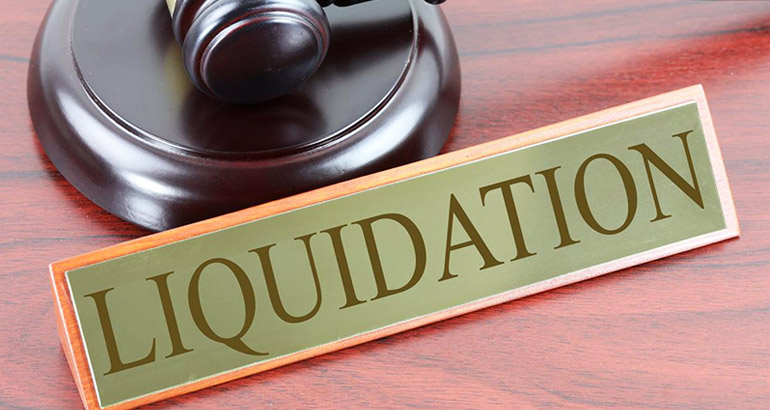Get This Report about Company Liquidation
Get This Report about Company Liquidation
Blog Article
The Ultimate Guide To Company Liquidation
Table of ContentsThe Buzz on Company LiquidationRumored Buzz on Company LiquidationNot known Details About Company Liquidation Some Ideas on Company Liquidation You Should KnowThe Buzz on Company Liquidation
A liquidator is particularly designated to manage the ending up of a business's affairs in order for it to be folded typically when the company is going bankrupt. The liquidator is an objective 3rd celebration who supervises the sale of company possessions in order to settle any arrearages.Their role consists of, yet is not restricted to: Objective Overseer: A liquidator is charged with acting as a neutral third event to oversee the entire business liquidation procedure. Develop Statement of Affairs: Liquidators should create an extensive statement of events document. This document is dispersed to financial institutions, outlining the present economic condition of business at the time of its liquidation.
After the liquidation of a company, its presence is removed from Firms Home and it ceases to be a lawful entity. If directors browsed the process uncreative, there would be no fines or personal responsibility for solid debts anticipated. Currently, with a clean slate, supervisors can explore brand-new company possibilities, though professional examination is advisable.
Get This Report on Company Liquidation
If even more than 90% of all firm shareholders agree, liquidation can take location on brief notification within seven days, the minimal statutory notice for lenders. Nonetheless, generally, the bigger the liquidation and the more possessions and resources business has, the longer the process will certainly take. 'Do I need to pay to liquidate my firm?', the answer will depend on whether or not your business has any type of possessions remaining when selling off.

We understand that no two companies coincide, which is why we will make the effort to get to know your business so we can advise the very best strategy for you. We just operate in your benefits, so you can be entirely positive in the service we offer.
Company Liquidation Can Be Fun For Everyone
In the UK, there is an established procedure to shutting down or reorganizing a restricted company, whether it is solvent or insolvent. This procedure is called liquidation and can just be dealt with by a licensed bankruptcy professional (IP) according to the Bankruptcy Act 1986. There are four major sorts of firm liquidation process: Creditors' Voluntary Liquidation (CVL); Compulsory liquidation; Management; and Participants' Voluntary Liquidation (MVL).

In these conditions, it is necessary that the company ceases trading; if business continues to trade, the supervisors might be held directly responsible and it could cause the insolvency expert reporting wrongful trading, called misfeasance, which might cause lawsuit. The directors select an insolvency expert and once this has actually been agreed and confirmed, there is a conference with the shareholders.
Certainly, if there are no shareholders, this action of the process is not needed (Company Liquidation). The IP takes control find out of the firm and starts the firm liquidation procedure. The directors are no longer associated with what occurs, consisting of the sale of the firm's properties. Nevertheless, if the supervisors desire any one of the properties, they can notify the IP.
The Main Principles Of Company Liquidation
The main difference is that the firm's financial institutions put on the court for a winding up order which forces the insolvent firm right into a liquidation process. For the most part, financial institutions take this activity as a last hope since they haven't obtained repayment through various other types of settlement. The court designates a bankruptcy expert, likewise called a main receiver, to carry out the compulsory firm liquidation process.
This sort of company liquidation is not volunteer and directors' conduct is reported to the UK's Secretary of State once the liquidation procedure has been finished. As a result, any kind of director that fails to accept the IP or has been associated with director misbehavior, or a deceitful act, Recommended Reading may cause serious effects (Company Liquidation).
It is used as a method to secure the company from any type of legal activity by its financial institutions. The supervisors of the firm agree to make regular repayments to resolve their debts over a period of time.
Examine This Report on Company Liquidation
This gives the firm with time to create a strategy moving forward to save the company and avoid liquidation. However, at this factor, supervisors hand control of the business over to the designated manager. If a firm is solvent however the directors and shareholders wish to shut business, a Participants Voluntary Liquidation is the right option.
The firm liquidation procedure is managed by a liquidator designated by the directors and investors of the business and they must authorize a statement that there are no creditors remaining. The official statement liquidation procedure for an MVL is similar to that of a CVL in that properties are understood but the earnings are distributed to the supervisors and the investors of the company after the liquidator's costs have been paid.
Report this page